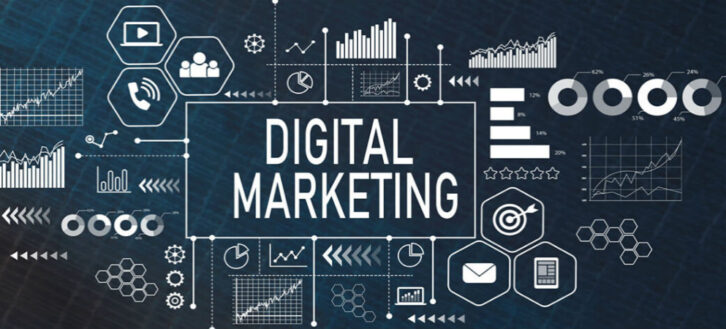Digital marketing has made a mark within the online space. It has existed since the infancy of the internet and it has evolved with it to become what it is today. For the most part, businesses were able to flourish with little help from the internet but as society moves deeper into the 21st century, there is more pressure to move businesses online or at least make their digital presence known.
The rise of different online channels meant that people have more ways to access and understand the online world. Social media platforms, blogging sites, and video sharing sites have all contributed to making consumers more reliant and invested on the internet. All this meant that for a business to thrive they should make strides to gain the attention and interest of internet users. Below are a few different ways to earn profit online through digital marketing.
1. Affiliate Marketing

Affiliate marketing is the process of making an earning through a commission by promoting other people’s or brand’s products. You choose a product that you like, promote it to other people, and earn a commission from each sale. This is a popular marketing tactic that helps drive sales as well as generate online income. Affiliate marketing is very beneficial to both marketers and brands.
Because affiliate marketing operates through delegating the marketing of the product to different parties, it can help leverage the abilities of many people for an effective marketing strategy while at the same time providing contributors with a slice of the profit.
To make affiliate marketing work, three parties have to be involved:
- Seller
- Affiliate or the advertiser
- Consumer
Seller
The seller is the one who has a product they wish to market. They could be a large enterprise or solo entrepreneur. They serve as the merchant, vendor, retailer, or product creator. The product they want to market could be a physical object or a service.
Sellers are also known as the brand and they don’t have to be an active participant in the marketing of their product, though they can also be an advertiser and make a profit from the revenue sharing from affiliate marketing.
Affiliate

Otherwise known as the publisher or advertiser, the affiliate can either be a company or an individual. They help market the seller’s products in a way that is appealing to target customers. Simply put, they are tasked at persuading potential customers that the products and services that the seller is offering have value or something that benefits them. When the customer completes a purchase of the goods or services, the affiliate marketer also receives a portion of the revenue.
Affiliate marketers generally have a specific audience to whom they advertise. Influencers on social media are the ones commonly tapped to be affiliate marketers owing to their large following of dedicated, often loyal, followers who are most likely to purchase a product that the influencer recommends.
Consumer
The consumers are the drivers when it comes to affiliate marketing. Marketers share and promote these products with them on blogs, websites, and social media. When a customer buys a product or service, both the affiliate and seller earns a profit.
2. Content Monetization

People around the world have worked tirelessly to build their content by posting unique details of their lives, experiences, or expert knowledge about a particular topic. They all have the internet to thank for that. For years, content creation was merely a way for people to express themselves with very little regard for profit. But as their following and internet clout grew, the opportunity to create a revenue stream out of their content grew. We usually call these popular content creators “influencers.”

Within the digital marketing agency space, content marketing has seen a surge in popularity within the online world. In order to attract more followers, you need to generate interest around yourself and the most effective way to do that is to produce content. Online content could come in different forms and the internet has made sure there is enough platform to host all of it.
Youtube hosts video content. WordPress and Wix are great for bloggers. Photos (and videos) are always a hit on Instagram. And SoundCloud and Spreaker are excellent podcast platforms.
All these content can be used to generate profit for the creator, granted the content is valuable and interesting enough to generate a lot of viewers, readers, or listeners. The more customers you are able to acquire and retain, the more money you can make. This is, in essence, how content monetization works.
Content monetization vs affiliate marketing
Content monetization is the tail end of content marketing. Content marketing makes the noise and generates interest, content monetization makes the profit. The driving goal behind marketing is to pull in more customers and followers monetization is to profit from them. Both can’t exist without the other.
The main goal of every business is to generate profit. Without profit, it’s almost impossible for any business to grow. Content monetization gives content creators the freedom they need in order to grow their business and compete in the market. It allows them to do what they do best (creating good content) without having to worry about making enough money. Content monetization is the idealization of the popular saying “turn your passion into profit.”
3. Become a Digital Marketer
A digital marketer is any person who monitors things such as what customers are looking at, where they are looking, how often, and how long they are engaged in a product. It is also their tasks to look at sales conversions and which content works and which ones don’t. These online marketers exist mostly online although others work in places like a digital marketing agency. Other channels that digital marketers can work include text messaging, instant messaging, podcasts, mobile apps, digital television, and radio channels.

Assets
Almost anything can be an asset to a digital marketer. So long as it helps you accomplish all your marketing tasks. Examples include:
- Your website
- Your brand’s logos, icons, etc.
- Video content
- Written content
- Images
- Reviews
- Online products and tools
- Social media profiles
Many digital marketers usually fall into these categories but more discerning marketers think of new ways to reach more potential customers online.
Strategies for a digital marketer
There is a constantly evolving list of strategies for digital marketers to use but the most common and popular ones include:
Pay-per-click advertising
Shortened to PPC, pay-per-click is a term that covers all types of digital marketing process where you pay every time someone clicks on an ad. Google AdWords is an example of PPC advertising referred to as paid search advertising. Facebook Ads are another example of PPC usually referred to as paid social media advertising.

Search engine optimization
If you’re not keen on paying just to appear in the SERPs, you can work to make your site optimized so it organically ranks higher when people search for your keywords and phrases. Getting a page to rank usually requires a lot of time and effort.
Content marketing
This is another broad term within the digital marketing space. Content marketing covers any form of digital marketing where content is used. Examples of content include blogs, videos, pictures, infographics, eBooks, etc.
Email marketing

One of the oldest forms of online marketing, email marketing remains to hold value and reliability in an age of social media and content creation. Marketers rely on email marketing when they want to advertise special deals, highlight content, or promote an upcoming event.
Getting started
Becoming a digital marketer isn’t too complicated. Most platforms online made it easy to sign up and start creating campaigns.
4. Blogging
When blogging first started, many called it a glorified online journal. The first bloggers merely wanted to share their thoughts, feelings, and insight. Becoming a professional blogger and making a profit was never their goal. The blogging world has certainly come a long way from that simpler time. Different types of blogs have emerged as well – from lifestyle, business, fashion, food, and entertainment.

Starting a blog is pretty straightforward and easy. Contrary to what most people believe, you don’t have to be a great writer to run a blog. People turn to blogs to get personal perspectives so bloggers can write in informal, often conversational, ways. What you need is the passion for the topic you’re covering, which leads to my next point – choosing a topic.
You need to choose a niche topic that you can write about. As mentioned, your blog could be about lifestyle, business, food, fashion, etc. But these are broad terms, if you really want to get noticed and attract online attention; you need to define your niche. Lifestyle topics could be about vegetarianism or a surfer lifestyle. For fashion, it could be deconstructing haute couture fashion. Ideas for food blogs could be eccentric restaurants and chefs creating unique and one of a kind dishes. As for business, it could increase online presence for small businesses. There’s virtually no limit to the type of topic your blog covers. In fact, you could even combine different topics in your blog.
And although the blogosphere has evolved tremendously in the last couple of years, the benefits of blogging remains plentiful. Most people who start their blog gain significant experience along the way. They get ideas for different blogs for different niches. The learnings they gained from starting and running one blog they can share with others who also want to start their own blog. All these could be monetized by the blogger through running ads, affiliate marketing, or pay-per-click ads on their blogs.
5. AdSense

Google has made it easy to monetize your website traffic through Google AdSense. Although there are many services like this, Google’s is the most popular. The program was first launched in 2003 and quickly became the most popular advertising program online. It provided site owners and webmasters to monetize their traffic.
Advantages of AdSense include:
- A large number of advertisers and publishers. As of late, there are over 10 million sites that are using AdSense.
- The program provides a high level of safety, security, and transparency for publishers and advertisers. All the important metrics can be tracked and monitored in the user’s Google Analytics account.
- Different variations of ads. Advertisers can choose to run images, text, HTML ads, videos, and many more in different sizes.
AdSense is free to use and offers a simple way for sites to earn money through displayed ads on their online content. It opens up a new revenue stream for content creators. With AdSense, it’s possible to show engaging, relevant, and valuable ads site visitors. The program is different from similar services because the ads features are served by Google Ads. Google then pays site owners for the ads that are displayed on their site based on the number of clicks the ad receives.
AdSense gives online creators access to a huge source of advertisers which translates to more relevant ads catered to the type of content you have. Google automatically chooses which ads are delivered to a particular site. The process involves several ways:
Contextual targeting: Google takes into consideration things like keywords, word frequency, font size, and overall link structure of the site to determine what the content is about and match it with Google Ads.
Placement targeting: Advertisers can choose specific ad placements on which to post their ads.
Personalized targeting: Personalized ads give advertisers the ability to reach users based on demographics, interests, and other criteria.
Run of Network targeting: This allows advertisers to target all sites within the AdSense network.
6. Lead Generation for Businesses

Lead generation is a marketing process of capturing interest in goods or services in order to develop a sales pipeline. Lead generation uses digital channels and has been going rapid changes as of late due to emerging online and social techniques.
The importance of lead generation
The buying process is constantly evolving and many marketers are driven to find new ways to reach buyers and attract the attention of customers amidst the noise. Instead of reaching customers through mass advertising and email blasts, marketers are focusing on being found and building relationships with buyers.
The old idea of lead generation revolved around the idea of finding the names of potential customers and passing them on to sales. Buyers before expect to be wooed by sales and sales expect that buyers are uneducated. But this has all changed.
Buyers today are informed through the vast information available online. These resources meant that buyers can learn a great deal about a product or service even before they speak to sales.
Earning a profit
Lead generation sites are different but the way that you earn money is through every lead that you generate for your client. It’s important to remember that there is no sale being made throughout the entire process. No goods or services have been bought; rather only information is being shared.
Companies vary on how they define a lead. Some consider it a lead only if they’ve filled out a form. Others only qualify for a lead if they picked up the phone and had a conversation for at least 30 seconds.
The premise behind lead generation remains the same even when every program differs significantly. Every lead that you send to the business, you will receive a fee for the information.
7. Digital Marketing Consultancy
People who work as digital marketing consultancies are people that work to advise, plan, research about internet marketing strategy. Being a consultant, the main goal is to leverage leads and conversions whose aim is to maximize leads and conversions.
The daily work of a digital marketing consultant includes:
- Auditing the client’s online presence for both website and social media pages.
- Creating internet marketing campaigns
- Conducting tests to maximize the effects of design and copy
- Reviewing campaigns using Google Analytics
In essence, the role of a digital marketing consultant is to guide companies in their efforts to position themselves within the digital environment. They offer personalized assessments through a variety of processes that includes evaluation, development, and optimizations of the different solutions they employ for the success of their business.
Many people who work as digital marketing consultants have extensive experience within the digital marketing space. A lot of them may have even started as sales or marketing representatives that made the transition into the online space. Regardless, to be a reliable and credible digital marketing consultant, you must be able to show either experience or credibility within the field.
Conclusion
The online space is ripe with opportunities on how to earn a profit. Different online channels offer different ways that users can make a profit. But it’s important to remember that businesses only thrive when the business owner or entrepreneur has the drive and passion to make the business a success. Although tools and software help to make a business grow, it is the will, perseverance, and sacrifice of the entrepreneur that determines if it will fail or succeed.
About the Author
Eliza Brooks is a passionate blogger and frequent traveler who loves to write about digital marketing, seo, social media marketing, and more. She is currently working with arcanemarketing.com, the leading social media advertising agency based in and around Idaho.


